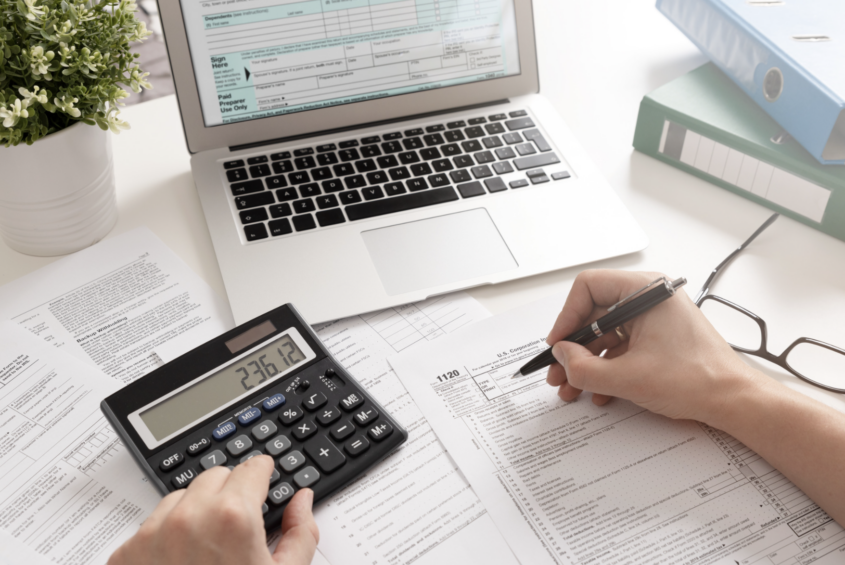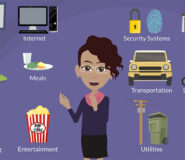Whether you are relatively new to caregiving or have been in this role for years, you do many things to ensure that your loved one receives the support they need. An important aspect of this process that should be considered sooner rather than later is tax preparation. Getting an elder’s financial affairs (and your own) in order early on is an essential step that can be particularly helpful as tax day approaches.
Get Organized
Every taxpayer should develop a personal organizational system to manage the important financial documents, forms and receipts they receive throughout the year. There’s no one-size-fits-all approach to staying organized, so each person’s method will be unique. You may prefer a simple three-ring binder to house all your paperwork or opt for filing cabinets of meticulously labeled hanging folders. Regardless of what type of system works best for you, having everything sorted and easily accessible will make filing infinitely easier.
As a caregiver, you may also need to assume responsibility for organizing your loved one’s financial documents. If necessary, start a separate set of tax files for them as well. Important items to keep track of include:
- Annual bank statements
- W-2 forms
- 1099 forms
- Payroll stubs
- Dividend distribution and gain and loss statements
- Donation receipts
- Closing statements from real estate transactions
- Receipts from any taxes paid throughout the year (estimated or quarterly)
- Receipts from any medical expenses that may be tax deductible
Many entities including banks and other financial organizations now offer digital or paperless forms and statements. Making a digital file for these documents on the computer can help save space by replacing paper files or serve as a back-up in case hard copies are damaged or lost.
Stay Current on Tax Information and Changes
It’s important to read up on all the possible tax implications of looking after an elderly loved one. You may have a handle on your own finances, but the world of elder care has its own set of rules and conditions. Understanding these distinctions can help you take advantage of certain opportunities to decrease your tax bill and prevent you from making costly mistakes. If there is something that you do not fully understand, don’t hesitate to consult a tax professional.
Determine if You Can Claim an Elderly Parent As a Dependent
Claiming a parent as a dependent can entitle you to additional tax credits (and tax deductions like their medical expenses if you choose to itemize). It is possible to claim other relatives (e.g., a parent-in-law, grandparent, sibling) and nonrelatives who are members of your household as dependents if they meet certain criteria.
If you can claim your care recipient as your dependent, you might qualify for the Credit for Other Dependents. This credit allows a filer to claim up to a $500 tax credit for each qualifying other dependent. You may also be able to take advantage of the separate nonrefundable Child and Dependent Care Credit if you must pay someone to care for your dependent elder so you can go to work or look for employment.
Determine if Your Loved One Needs to File Taxes
An elder may not need to file a personal income tax return depending on their age, gross income, filing status and whether they are being claimed as a dependent. There are specific income limits that dictate whether a senior has to file, but remember that Social Security benefits are considered tax-exempt income in most cases.
To find out if you or someone you care for is required to file a tax return or should file to receive a refund, use the “Do I Need to File?” tool on IRS.gov.
Get a Copy of Your Loved One’s Most Recent Tax Filing
Even if your loved one can be claimed as a dependent and/or does not have to file their own tax return this year, obtaining a copy of their most recent filing can provide an important reference point to help you determine the forms and information that must be considered when filing future returns.
IRS Authorization for Caregivers With POA
Non-IRS power of attorney documents are recognized by the IRS, but caregivers must complete one extra step to receive authorization to handle tax matters on behalf of their care recipients. If you have already been granted durable financial power of attorney (POA), you may be able to sign your loved one’s tax return if it falls under the specific powers outlined in the POA document. In order to do so, you must file Form 2848 (Power of Attorney and Declaration of Representative) along with a copy of the non-IRS POA document.
A senior who is still competent and wishes for a family member to handle their tax preparations but has not completed a financial POA will also need to file Form 2848. It’s important to note that this form will ONLY grant the family member the power to act on their behalf before the IRS. It will not grant any other financial powers on behalf of the elder.
Sometimes it can be difficult to ensure that the IRS will accept a non-IRS POA, so requesting help from the attorney who prepared the POA document may be worthwhile.
Seek Help With Tax Preparation
For assistance with basic questions, visit the IRS website to use their Interactive Tax Assistant tool. These brief online interviews can help you through some of the common tax questions that arise for many family caregivers each year. There are also several sources that provide free tax preparation help, tax tips and other financial advice for seniors and their caregivers.
Content provided by Aging Care.




